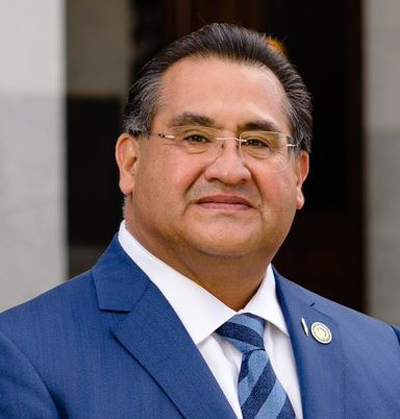Attorney General Bonta, Assemblymember Ramos Highlight $5 Million State Investment Aimed at Supporting Public Safety on Tribal Lands
4 min read
California Attorney General Rob Bonta and Assemblymember James C. Ramos recently highlighted a major new $5 million investment in the state budget aimed at supporting public safety on tribal lands in California. The funds are for the implementation of California Assembly Bill 3099 (AB 3099), which calls for the California Department of Justice to provide training and guidance to law enforcement agencies and tribal governments to help reduce uncertainty regarding criminal jurisdiction and improve public safety on tribal lands. The new effort also includes funds to study challenges related to the reporting and identification of missing and murdered Native Americans in California, particularly women and girls. California is home to one of the largest populations of Native American and Alaskan Native heritage people in the country — with approximately 176 California Native American Tribes and a little over 100 separate tribal reservations.
“No family in California should have to fear for their loved ones,” said Attorney General Rob Bonta. “Unfortunately, it’s all too clear that many of our tribal communities feel under threat. We can’t shy away from that reality. We must work to help bridge communication gaps between our law enforcement partners and tribal communities across the state. That’s why these $5 million to implement AB 3099 are so critical. This is an opportunity to build a path forward together to better understand and ultimately help solve the challenge before us. We do not take this responsibility lightly. Too many indigenous families have been torn apart and too many innocent lives have been lost. At the California Department of Justice, we’re committed to doing our part to stand up for all of the people in our state.”
“Today, we celebrate a historic commitment by the State of California to the safety of Native American people,” said Assemblymember James C. Ramos. “The combined passage of AB 3099 and state budget funding will enable the state to create unprecedented, sustained attention and effort to end violence on tribal lands. We hope this new effort results in resolving the challenges to public safety that cause untold pain and grief to Native American people.”
“As Chair of Budget Subcommittee 5 on Public Safety, I’m proud to work with Assemblymember Ramos to secure $5 million in this year’s budget,” said Assemblymember Cristina Garcia. “This spotlight on Missing and Murdered Native American People (MMNAP) is long overdue and it’s finally happening because of Mr. Ramos’ leadership and historic win as the first Native American in the state legislature. This is just one example of how representation matters. As the Chair of the Legislative Women’s Caucus, we want to ensure we are amplifying that voice and ensuring that we are expanding the awareness on this important issue to communities outside the Native American/Indigenous community. A 2020 study indicated that there were more than 2,300 missing indigenous women and girls in the country – that is unacceptable, we must do better.”
In 1953, Congress enacted Public Law 83-280 (PL 280), expressly transferring criminal jurisdiction over most crimes committed by or against Native Americans on tribal land from the federal government to designated states, including California. As a result, California and tribal governments share concurrent criminal jurisdiction — with the federal government in limited circumstances — on tribal lands in the state. Although PL 280 has been in existence for almost 70 years, its requirements and implications often remain confusing among state, local, and tribal authorities. Generally, the complexity of PL 280 can and has led to public safety uncertainty and frustration among tribal communities and their neighbors. AB 3099 highlights the importance of providing for the consistent application of PL 280 through education, training, technical assistance, and increased coordination among California’s sovereign tribal governments and local authorities in the 34 California counties that touch on tribal lands.
AB 3099 also calls for the California Department of Justice to conduct a study to determine how to increase state criminal justice protective and investigative resources for reporting and identifying missing Native Americans in California. Numerous studies have already highlighted concerns among tribal nations regarding the number of missing Native Americans, both reported and unreported, across the United States, particularly women and girls. For instance, based on data from the National Crime Information Center Missing Person File, American Indians, Alaska Natives, Native Hawaiians, and Pacific Islanders combined made up the second highest number of reported missing persons in 2018, despite making up the smallest portion of the U.S. population. However, given many of the existing jurisdictional challenges, clear data on the scope of the issue in California remains limited. According to the Federal Bureau of Investigation, there were approximately 1,496 active end-of-year missing persons cases out of a total of 9,575 reports for American Indian and Alaska Natives across the United States in 2020.
In order to help address these challenges, AB 3099 works to fill the gaps by establishing the Tribal Assistance Program within the California Department of Justice’s Office of Native American Affairs. The law requires the new program over a period of five years, among other things, to:
· Develop guidance for law enforcement training on policing and criminal investigations on tribal lands consistent with PL 280;
· Provide educational materials geared towards tribal citizens about the complexities of concurrent criminal jurisdiction under PL 280, including information relating to victims’ rights and the availability of services in the state;
· Share guidance on improving crime reporting, crime statistics, criminal procedures, and investigative tools for police investigations conducted under PL 280;
· Facilitate and support improved communication between local law enforcement agencies and tribal governments; and
· Conduct a study to determine the scope of the issue of missing and murdered Native Americans in California, identifying barriers to reporting and ultimately issuing recommendations to the State Legislature.
More information on the California Department of Justice’s Office of Native American Affairs is available here. The text of AB 3099 and its full requirements is available here.




